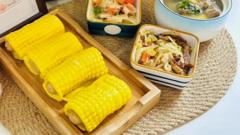In a troubling case of food safety negligence, 233 children from a kindergarten in Tianshui City, Gansu Province, were hospitalized after consuming food decorated with lead-laden paint. The incident has sparked outrage and ignited discussions about food safety regulations in China.
Food Safety Crisis: 233 Students Hospitalized Due to Toxic Food Decorations in China

Food Safety Crisis: 233 Students Hospitalized Due to Toxic Food Decorations in China
A shocking incident at a kindergarten in Gansu Province leads to mass lead poisoning as improper food decoration practices are revealed.
In a disturbing turn of events, more than 200 young children are receiving treatment for lead poisoning in north-west China after being served food that had been decorated using inedible paint. Authorities reported that 233 students at Peixin Kindergarten in Tianshui City were affected after consuming steamed red date cakes and sausage corn buns tainted with lead levels astonishingly exceeding safety standards—by as much as 2,000 times.
The school's principal directed the kitchen staff to procure the paint online, which was clearly labeled as inedible. Following reports of illness among the children, local police were able to locate and retrieve the hazardous materials, which had been concealed. As a result, eight individuals have been arrested, including the principal and key investors of the kindergarten.
Parents have expressed significant concern regarding the potential long-term health implications of lead poisoning for their children. One parent, Mr. Liu, shared that his son required hospitalization and ongoing treatment after experiencing symptoms such as stomach pain and a loss of appetite, symptoms reportedly prevalent among various children since March.
Footage from CCTV indicated that staff members were seen mixing the toxic paint into the food preparations. Tests revealed alarming lead concentrations in the food items—1052 mg/kg in the red date cake and 1340 mg/kg in the sausage corn rolls, both of which far surpass the national safety limit of 0.5 mg/kg for edible products.
In the wake of the incident, Tianshui's mayor, Liu Lijiang, admitted that this case highlights critical deficiencies in food safety oversight, asserting the necessity for reform and enhanced monitoring in the future. As investigations continue, the community remains on high alert regarding food safety practices in educational institutions.





















